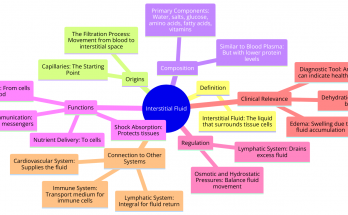Lymph called Extracellular Fluid for the followinf reason –
- Lymph is the clear, watery fluid that circulates throughout the Lymphatic System. It is considered extracellular fluid because it is outside the cells and bathes the cells in the body. Extracellular fluid is defined as the fluid that surrounds the cells and is outside the cells in the body.
- Lymph is formed from interstitial fluid, which is the fluid found in the spaces between the cells. As blood circulates through the capillaries in the body, fluid and nutrients are forced out of the capillaries into the interstitial spaces. This fluid then becomes the interstitial fluid. The interstitial fluid is important for transporting nutrients and waste products to and from the cells.
- Lymph is formed from the interstitial fluid collected by the lymphatic vessels. These vessels have a one-way system, which means that the lymph only flows in one direction – from the tissues to the heart. This one-way flow is maintained by the presence of valves in the lymph vessels. The valves prevent the lymph from flowing backwards and ensure that the lymph only flows in one direction.
- Since lymph is outside the cells and bathes the cells in the body, it is considered an extracellular fluid. Unlike blood, which is considered an intracellular fluid because it is in the blood vessels and circulates within the body, lymph circulates outside the blood vessels and is considered an extracellular fluid.
In summary Lymph is called extracellular fluid because it is outside the cells and bathes the cells in the body. It only flows in one direction, from the tissues to the heart, because the lymph vessels have valves.
Also Check – How Lymph is Formed ?
Also Check – Difference between Lymph and Plasma
Also Chekc – 13 Important Differences between Lymph and Blood
Also Check – 15 Important Functions of Lymph
Also Check – What is Interstitial Fluid and its Vital Role in Cellular Health and Function

